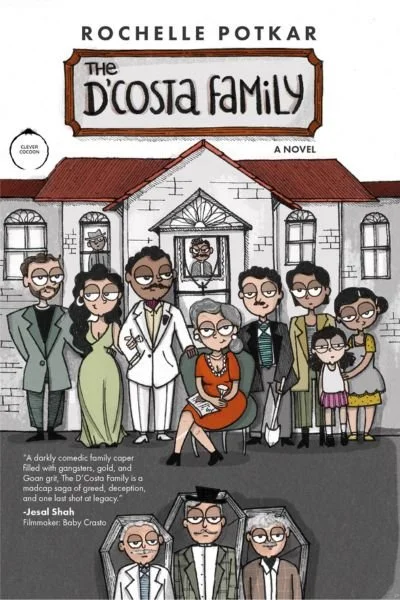By Maulee Senapati
Rochelle Potkar’s The D’Costa Family is a novel of quiet detonations. It dismantles the sentimental myth of the family—especially the joint family—to expose its volatile, often coercive architecture.
A masterstroke of quiet disruption, an audacious, intimate excavation of a Goan Catholic household, where the fine-meshed threads of the personal and political are intricately woven into the fabric of daily life. With prose that’s both lyrical and unsparing, the author dismantles the illusion of family as refuge, revealing instead a terrain marked by tenderness, longing, and quiet intensity.
Set within a Goan Catholic household, the novel operates simultaneously as an intimate portrait and sociological critique. Family here is no sanctuary; it is a site of negotiation, conflict, and inheritance, where tenderness and grievance coexist in precarious balance.
Potkar’s prose is stripped of excess yet alive with precision. She has the poet’s instinct for silence and the sociologist’s eye for structure. The novel’s meaning often lies in the unsaid, in the pause at a meal, the withheld glance, the choreography of avoidance. Dialogue is sparse; silence becomes the true medium of communication, a tool of both memory and control.
Narratively, the book resists the smooth arc of the traditional saga. Instead, it moves in shards and glimpses, each vignette illuminating part of the household’s machinery: alliances formed, bargains struck, rules enforced. This fractured form mirrors the joint family itself: part refuge, part theatre, part tribunal. Stability is offered, but at the price of conformity; love is extended but braided with authority. Yet all this lucidly encompassed into prose, with an almost Dyostoveskian precision.
Potkar captures the paradox that has long defined the joint family in South Asia: the promise of belonging, shadowed by the demand for submission. The novel’s sociological power lies in its refusal to romanticize. It shows how power circulates invisibly within such households, across generations, along gendered lines, under the cover of tradition. Faith structures habit; sexuality, often repressed, surfaces as quiet resistance; memory, selective and distorted, becomes both glue and weapon. These elements are not incidental, they are the very codes through which the joint family reproduces itself.
What sets the novel apart is its refusal of resolution. Potkar doesn’t redeem or indict. Crucially, she denies catharsis. There are no easy redemptions or reconciliations. Change, when it appears, is hesitant and belated, incapable of erasing damage already done. Instead, she observes, with an unblinking eye, inviting readers into the ache of unspoken truths and the labyrinth of being. The D’Costa Family doesn’t end; it haunts. This refusal of closure is the novel’s sharpest insight: the joint family cannot be redeemed by nostalgia, only understood in its contradictions.
This is not mere storytelling, it’s a scalpel to the psyche. Faith, sexuality, memory, and generational trauma intersect with unsettling normalcy. The sacred and profane share the same space, and silence often carries the most impactful weight.
The D’Costa Family is more than the story of one household. It is a lens trained on the joint family as an institution, revealing in the process how its comforts and continuities are inseparable from its coercions. Potkar leaves us with an unsettling clarity: the walls that promise shelter are often the same ones that slowly close in.
Maulee Senapati is an award-winning filmmaker, artist, and a film academic. He is an alumnus of FTII, Pune, the premier film institute of India. Presently, Senapati is engaged with the Faculty of Film and TV, Dada Lakhmi Chand State University of Performing and Visual Arts, Rohtak (Haryana), India, as a professor of Film Direction.
The D’Costa Family can be purchased here.

